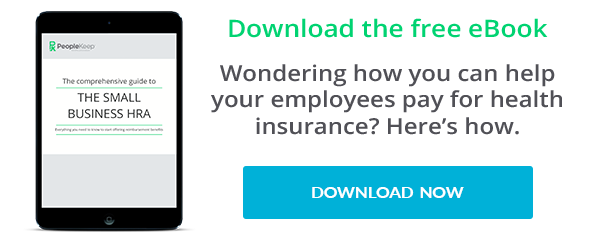Health Insurance Allotments - Small Business Do's and Don'ts
By Christina Merhar on February 17, 2014 at 11:10 AM
Small and mid-size businesses are using a "pure" defined contribution strategy to offer employees an allotment for health insurance, rather than offering employees a specific group health insurance plan. But, there is a right way and a wrong way to set up and administer health insurance allotments.
Here are four best practices ("do's") for small businesses setting up health insurance allotments, and three health insurance allotment "don'ts."

Overview of Health Insurance Allotments and Defined Contribution
"Pure" defined contribution healthcare is a strategy where employers offer allotments for health insurance. With this type of arrangement, the small business's contribution is to the health insurance allotment (via a Section 105 Healthcare Reimbursement Plan or other IRS-approved plan) rather than contributing to group health insurance premiums.
The concept of health insurance allotments is taking off because, on average, individual health insurance costs less than group health insurance premiums. Businesses see their health benefits dollars go farther.
Health Insurance Allotments - 4 Small Business "Do's"
-
Do Use a Formal Defined Contribution Health Plan: Some small businesses consider setting up health insurance allotments without a formal defined contribution health plan. In other words, they consider bonusing or giving raises to employees for their personal health insurance. However, using a formal Section 105 defined contribution health plan saves the small business money (because of the tax savings), and keeps the business compliant with federal regulations.
-
Do Set Affordable Allotment Amounts: Set employee allotments at a rate the small business can sustain. It is always better for employee relations to increase the benefit level rather than decrease the benefit level.
-
Do Use Defined Contribution Software: Defined contribution software allows the small business to administer the plan 24/7 online, easily add reimbursements to payroll, and change plan design (and plan documents) at any time, with no additional fees. Defined contribution software also makes it easy for employees to view their allotment amount in real time and submit requests for reimbursement anytime, online. See: 14 Features To Expect From Your Defined Contribution Provider.
-
Do Select an Insurance Broker: Work with an insurance broker to help employees select and purchase personal health insurance policies. Select an insurance broker familiar with individual health insurance policies, defined contribution, and health care reform.
Health Insurance Allotments - 3 Small Business "Don'ts"
-
Don't Let Employees Contribute: Section 105 defined contribution health plans are, by definition, 100% employer-funded. Allowing employees to contribute invalidates the health insurance allotment tax benefits.
-
Don't Self-Administer the Health Insurance Allotments: Self-administering the allotments puts the small business at risk of violating IRS (tax benefits), HIPAA (medical privacy), ERISA, and ACA (health care reform) compliance issues. Using a defined contribution software provider ensures compliance.
-
Don't Forget to Educate Employees: Providing health insurance allotments is a different type of health benefits. Select a defined contribution provider that provides a clear Summary of Benefits and Welcome Kits to employees. This will contribute to employee education, understanding, and satisfaction.
What questions do you have about health insurance allotments? Leave a comment or question below.
Check out more resources
See these related articles

Stop Giving Raises for Health Insurance and Start Offering Defined Contribution Allowances
How small businesses will save taxes by offering a formal Section 105 defined contribution allowances instead of salary bonuses for health insurance.

The CEO's Guide to Evaluating Employee Health Insurance
A guide for CEO's on evaluating employee health insurance. The 4 questions CEOs should ask about employee health insurance, and the 3 core employee health insurance options.

5 Innovative Ways Businesses Are Using Health Insurance Allowances
How are innovative businesses using health insurance allowances? Here are five innovative ways businesses are using health insurance allowances.



